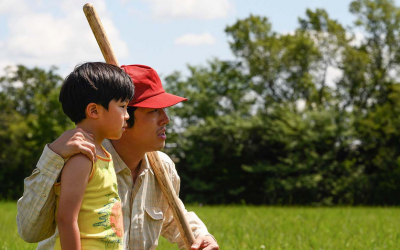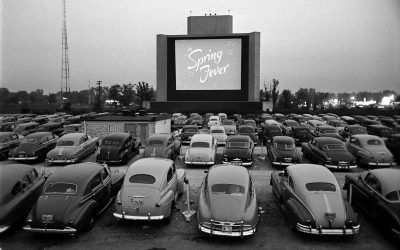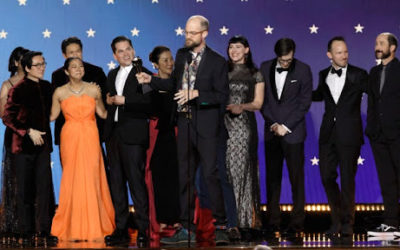There was a time when many referred to Greta Gerwig as a small indie actor who starred in minor films that went nowhere but a film festival and then into a vault of all the lost films that Hollywood chose not to showcase. Many of us, however, need to become more familiar with Greta, as it seems she’s here to stay, and her stories are here to change cinema as we know it. While it may seem that Gerwig has been intricately placed into the laps of the Hollywood Foreign Press Association and that her success is fortuitous, Gerwig’s upbringing is a peculiar one but also inspirational.
Gerwig began her acting career after graduating from Barnard College in 2006. But this was not always her plan; after completing her undergraduate, Gerwig applied to several master’s programs to become a playwright. Unfortunately, she was rejected by every single one. It’s interesting to consider that the director/writer of the highest-grossing film of 2023 was dismissed from every master’s program, but it’s also refreshing, right? Greta Gerwig was not a hidden gem in the back of the classroom waiting for the professor to single her out and take her on a journey of success. She was a student, learning how to be a writer and earning her stripes. After this rejection, Greta began to star in many “mumblecore” films, a genre of low-budget movies that frequently feature amateur actors and naturalistic settings. It’s easy to see how these genres played a role in Greta’s solo directorial debut ‘Ladybird’ and its experimental tendencies.
Speaking of LadyBird, When Gerwig was 34, she directed her first film in 2017, Ladybird, a story on the self-discovery of a strong-willed 18-year-old and her mother and in 2019’s, Little Women a classical book adaptation about four sisters. Both films heavily surrounded the multifaceted, calculated, mysterious phenomena: women.
Hearing through the grapevine that Gerwig would write and direct the Barbie movie wasn’t surprising. It was, however, a surprise to see how it was executed. When we think of Barbie, a convoluted conversation arises. The debate of Barbie’s ability to do more harm than good and vice versa is at the center of the field. For some girls, Barbie reminded them of everything wrong with them. With others, Barbie showed them everything they could be.
The hype for the Barbie movie was extensively growing by the month, and memes flooded every social media site about what the film may be. But no one knew what the Barbie movie would give us.
Somehow, Greta turned Barbie inside out; she reflected on Barbie’s flaws and how Barbie thought she was changing the world when, in reality, she wasn’t. But it did something else. Rejecting past preconceptions is a frequent feminist theme, but Greta has sensitively re-envisioned a common ground allowing women to be themselves. The vitality of a woman’s spirit, as opposed to her status as a lover or academic achiever, determines her value. And when Barbie began to feel like she wasn’t contributing to her community enough, she began to fumble. Her fears manifested into physical entities, cellulite, falling off the 3rd story of her dream house, and flat feet! These humorous, often bemusing strokes of bad luck made us, as the audience, laugh but comforted the women in the theatres who all felt like a Barbie doll falling off a 3rd story floor. The reality is that it’s normal to feel out of place, not enough, or behind everyone. But the female audience rarely saw that on the movie screens. At one point, we all will feel like the stereotypical Barbie, the Barbie who is not a veterinarian, a naval officer, or a fashion designer, just your average everyday Barbie.
Barbie wasn’t the customary superhero of the film. At times, she was the underdog. To make up for the lack of female leads in movies, many directors and writers will write the female lead to be cutthroat, desensitized, cynical, and harsh to the touch. But not all women exist like that; a woman is allowed to be lost, and she is allowed to feel out of place, and this is not something that is a direct consequence of her gender. Women can solely exist as multifaceted beings with hopes, ideas, fears, anxieties, and, most of all, mistakes.
Barbie also ruled out a prospective male lover. Growing up, it was always Barbie and Ken. Sometimes, I we might say Ken under our breath. He wasn’t nearly that important to us. And that was a universal thing, instead of turning this dynamic of 2 characters into a women-hating man trope. It became something beautiful. While Barbie did not romantically want Ken, she wanted the best for him as a friend. She led him on a journey of self-exploration to help him find his own path that was not adjacent to her. He didn’t have to be ‘and ken’; he could be just ‘ken.’
It’s vital to add that Gerwig is not the only female director on an expedition to redefine what it means to be a girl. There is a throng of female storytellers who need a shoulder to sit on to get their stories told. And with Gerwig’s success, we hope that soon we won’t have to make another table; we can all sit on the same one.




